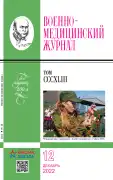Determinants of the health of military personnel before and during the COVID-19 pandemic
- Authors: Korshever N.G.1, Zhuravlev V.K.2, Royuk V.V.3, Dorfman Y.R.4
-
Affiliations:
- The V.I.Razumovsky Saratov State Medical University of the Ministry of Health of the Russian Federation
- The S.M.Kirov Military Medical Academy of the Ministry of Defence of the Russian Federation
- The I.M.Sechenov First Moscow State Medical University Ministry of Health of the Russian Federation
- Astrakhan State Medical University of the Ministry of Health of the Russian Federation
- Issue: Vol 343, No 12 (2022)
- Pages: 11-17
- Section: Organization of medical support for the military establishment
- URL: https://journals.eco-vector.com/0026-9050/article/view/629773
- DOI: https://doi.org/10.52424/00269050_2022_343_12_11
- ID: 629773
Cite item
Abstract
The purpose of the study is to determine the list, structure and significance of health determinants before and during the novel coronavirus infection (COVID-19) pandemic. An expert survey of 36 military health officials identified 40 determinants of the health of military personnel, 33 of which represent 4 groups («Lifestyle» – 7, «Factors of military service» – 19, «Structural indicators of socio-economic inequality» – 2, «General social and economic and natural-biological factors» – 5) and 7 – non-group, as well as the significance of each of them. Under conditions of the COVID-19 pandemic, the health of military personnel is determined by the same 40 factors. Significant differences in the significance of the determinants of the health of servicemen under the conditions under consideration were revealed. During the COVID-19 pandemic, this characteristic is significantly higher for 20% of the determinants, and lower for 70%. The significance of 10% determinants has not changed. The results of the study expand our understanding of the scientific apparatus for protecting the health of military personnel, including during the COVID-19 pandemic.
Keywords
About the authors
N. G. Korshever
The V.I.Razumovsky Saratov State Medical University of the Ministry of Health of the Russian Federation
Author for correspondence.
Email: korshever@bk.ru
профессор, полковник медицинской службы в отставке
Russian Federation, SaratovV. K. Zhuravlev
The S.M.Kirov Military Medical Academy of the Ministry of Defence of the Russian Federation
Email: korshever@bk.ru
доцент, полковник медицинской службы
Russian Federation, St. PetersburgV. V. Royuk
The I.M.Sechenov First Moscow State Medical University Ministry of Health of the Russian Federation
Email: korshever@bk.ru
кандидат медицинских наук
Russian Federation, MoscowYu. R. Dorfman
Astrakhan State Medical University of the Ministry of Health of the Russian Federation
Email: korshever@bk.ru
кандидат медицинских наук, полковник медицинской службы запаса
Russian Federation, AstrakhanReferences
- Дыбин А.С. Образ жизни и факторы воинской службы, влияющие на качество жизни, связанное со здоровьем военнослужащих // Бюл. Северного гос. мед. ун-та. – 2020. – № 1 (44). – С. 271–274.
- Есипов А.В., Алехнович А.В. Военная безопасность государства в условиях эпидемий: история и современность // Воен. мысль. – 2022. – № 1. – С. 65–77.
- Есипов А.В., Алехнович А.В., Абушинов В.В. COVID-19: первый опыт оказания медицинской помощи и возможные решения проблемных вопросов (обзор) // Госпит. медиц.: наука и практика. – 2020. – Т. 1, № 1. – С. 5–8.
- Карташов И.Г. Условия жизни военнослужащих по контракту как фактор их здоровья // Социологич. исследов. – 2008. – № 2 (286). – С. 118–122.
- Киселев Н.Н., Киселева В.П. Актуальные проблемы здорового образа жизни в профессиональной деятельности военнослужащих // Известия Рос. воен.-мед. акад. – 2019. – Т. 38, № 3. – С. 66–68.
- Коршевер Н.Г., Помошников С.Н. Принятие управленческих решений в медицинских организациях: научное обоснование // Здравоохр. Рос. Фед. – 2020. – Т. 64, № 1. – С. 14–21. doi: 10.18821/0044-197X-2020-64-1-14-21
- Крюков Е.В., Шуленин К.С., Черкашин Д.В. и др. Опыт медицинского обеспечения кораблей и частей иностранных армий в период пандемии новой коронавирусной инфекции // Морская медицина. – 2021. – Т. 7, № 1. – С. 69–77. doi: 10.22328/2413-5747-2021-7-1-69-77
- Лисицын Ю.П. Образ жизни и здоровье. – М: Изд-е МГМСУ, 2011. – 192 с.
- Лычагина С.В. Влияние агрессивности на психологическое здоровье военнослужащих войск национальной гвардии // Методология соврем. психол. – 2019. – № 10. – С. 83–89.
- Мишин В.М. Исследование систем управления. 2-е изд., стереотип. – М.: ЮНИТИ-ДАНА, 2005. – 527 с.
- Петровская М.В., Емельяненко А.А. Гендер как детерминанта успешности в образовательном пространстве военного вуза. – Ульяновск: Зебра, 2015. – 188 с.
- Терехин Р.М. Социально-психологические детерминанты психологической готовности военнослужащих к изменению служебной ситуации в процессе военно-профессиональной социализации. – СПб: Центр стратегических исследований, 2020. – 88 с.
- Толстых В.В., Ямпольский С.М. Влияние пандемии коронавируса СOVID-19 на деятельность Вооруженных Сил Российской Федерации и иностранных армий по обеспечению обороноспособности государства // Национ. безопасн. и стратегич. планиров. – 2020. – № 3 (31). – С. 30–36. doi: 10.37468/2307-1400-2020-3-30-36
- Тришкин Д.В. Медицинское обеспечение Вооруженных Сил Российской Федерации в условиях пандемии новой коронавирусной инфекции: итоги деятельности и задачи на 2021 год // Воен.-мед. журн. – 2021. – Т. 342, № 1. – С. 4–19.
- Edge H.M., Carlucci S., Lu D. The role of Force Health Protection in the Canadian Armed Forces’ response to the COVID-19 pandemic // Сan. Сommunic. Dis. Rep. – 2020. – Vol. 46, N 9. – P. 279–281. doi: 10.14745/ccdr.v46i09a05
- Korshever N.G., Sidelnikov S.A. Intersectoral cooperation in the sphere of public health care: ways of optimization // Rus. Open Medic. J. – 2017. – Vol. 6, N 3. – P. 10. doi: 10.15275/rusomj.2017.0308
- Whitehead M., Dahlgren G. What can we do about inequalities in health? // Lancet. – 1991. – Vol. 338, N 8774. – Р. 1059–1063. doi: 10.1016/0140-6736(91)91911-D)
Supplementary files







